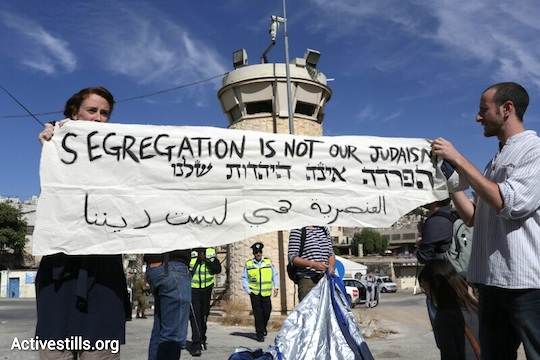For years there have been calls for on-the-ground opposition to the occupation. Now there are a growing number of Jewish platforms — and voices — seeking to make it happen.
By A. Daniel Roth

The way the world is talking about the Israeli occupation is changing. Alongside that change, opportunity is knocking for those of us standing in opposition: calls for diaspora Jews to be present on the ground in Israel and Palestine are increasing. An important shift is beginning to take place — right now.
The writing is on the wall. Since Prime Minister Benjamin Netanyahu was re-elected, U.S. President Obama and his staff have been speaking differently about the once-incontrovertible two-state solution. One campus Hillel changed its name instead of changing it’s programming to adhere to Hillel International’s rules. If Not Now stormed onto the scene last summer in response to the violence in Gaza. Boycotts and BDS campaigns are sprouting up on campuses and at supermarkets all over the world.
That was on display for anyone to see last week in Washington D.C. The J Street conference, which brought together over 3,000 people, saw a series of fired up conversations that put shone a spotlight on the American-Jewish relationship with Israel. During a panel on liberal Zionism, Israeli journalist (and +972 blogger) Noam Sheizaf made a clear plea for a collective refocusing from “state solutions” to the urgency of ending the inequality that exists for millions under occupation, who lack freedom of movement or access to civilian courts.
Peter Beinart also took a step forward on stage, calling on young Jews from North America and around the world to stand physically in Israel and Palestine, and to take part in Palestinian non-violent resistance to the occupation.
For years there have been calls for on-the-ground participation from a variety of communities. Recently, there has been a surge in Jewish platforms for those communities to take part in peace and justice work.
A Jerusalem-based volunteer program for young American Jews (which I co-founded) called Solidarity of Nations-Achvat Amim engages in human rights work and learning based on the core value of self-determination for all peoples. All That’s Left (of which I am a member) is a collective aimed at engaging the diaspora in anti-occupation learning, organizing, and on-the-ground actions. The new Center for Jewish Nonviolence has already brought a delegation to help Palestinian farmers to replant trees the IDF uprooted last spring.
It is important that Jewish communities with connections to Israel take part in this movement. Whether they have a personal, communal, religious or cultural relationship with this land, diaspora communities should be on the forefront, stepping up to take responsibility for a peaceful and just future here.
The groups and initiatives I mentioned above are working on engaging even more people in this work: bringing dozens of diaspora Jews — who are already living and learning in Israel — to do solidarity work with Palestinians. In the coming months, they hope to bring hundreds more from around the world for direct actions and educational initiatives in the West Bank.
There are important roles for people from all over the world, of various backgrounds, in organizing opposition to the occupation. Right now, at this very moment, there is a growing call for diaspora Jews to to find their way here and stand up for equality. It’s time to answer that call.
A. Daniel Roth is a journalist and educator based in South Tel Aviv. His writing and photography is at allthesedays.org and you can follow him on Twitter @adanielroth.

